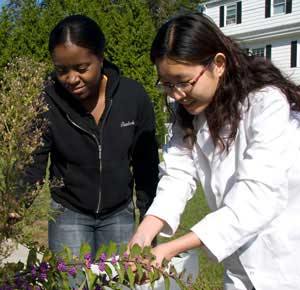 Undergraduate degree to prepare students for research, industry careers
Undergraduate degree to prepare students for research, industry careers
KINGSTON, R.I. – July 8, 2009 – A high school student wants to pursue a career as a researcher in the pharmaceutical industry, but she doesn’t want to become a pharmacist. Another student is thinking about working in pharmaceutical sales or in the management side of the industry. Like the potential researcher, he doesn’t want to pursue the now standard six-year doctor of pharmacy degree.
The University of Rhode Island now has the answer for those students with its four-year, bachelor of science in pharmaceutical science. The program in URI’s College of Pharmacy is accepting students for fall.
“The new BSPS degree will offer students an opportunity to enter the global pharmaceutical industry with a great degree of upward mobility,” said Ron Jordan, dean of URI’s College of Pharmacy. “The pharmaceutical industry needs employees who have strong backgrounds in the drug development, regulatory and health delivery systems. Our College of Pharmacy excels at these areas of teaching and research. Our faculties are internationally renowned and our history in pharmaceutics as a concentration is long and significant. Some of our most respected and successful graduates earned degrees from the college that prepared them for the industry, government and teaching in these areas. We expect this program to be very successful.”
Pharmacy Professor Clinton Chichester, chair of the College’s Department of Biomedical and Pharmaceutical Sciences, said the program is designed to prepare students for careers in the pharmaceutical, consumer product and health care industries. Graduates will be qualified to seek a diverse range of career options, including research and development, manufacturing, product marketing, sales, testing and administrative positions within the pharmaceutical industry. The degree could also lead to research and regulatory oversight careers within government agencies, and research and teaching positions in higher education.
At URI’s College of Pharmacy, the education of new pharmacists includes heavy amounts of clinical training in hospitals and other health care agencies during the six-year doctor of pharmacy program, leaving little time for biomedical research, according to Chichester.
“As the College and others around the country have become more focused on clinical education for pharmacists, we’ve drifted from the biomedical research focus,” Chichester said. “Our pharmacy students are educated much like physicians, with a focus on patient care, disease management and pain management. This new program will give students the opportunity to focus on drug discovery and related areas of drug manufacturing and drug delivery. This is the discipline of pharmaceutics – discovering compounds that work, developing the pill and the formulations.
“The opportunities for this kind of work are plentiful and varied, including careers in large pharmaceutical companies to biomedical start-up companies that could fuel a spurt of economic development in our state and around the region.”
Chichester said the students will have the chance to be engaged with researchers at the College who are known worldwide for their work on AIDS, cancer, drugs from the sea and from plants and berries, Alzheimer’s disease, and the efficacy and safety of drugs for transplant patients.
“They will be working on advanced science that has the potential to be published in professional and academic journals,” Chichester said.
“We also want to maximize our researchers’ time in the classroom,” Chichester said. “Students are attracted to these faculty and now they will have great opportunities to work with them in the lab.”
The first two years of the 120-credit program include rigorous basic science requirements and a broad exposure to the humanities, arts, and social sciences. Courses offered in the third and fourth years will be drawn from the existing curriculum and taught by Department of Biomedical and Pharmaceutical Sciences Faculty. Students may also elect to obtain course credits for laboratory research performed under the guidance of a faculty mentor. They will also be able to tailor their academic program for specific career paths with a program advisor.
Media Contact: Dave Lavallee, 401-874-5862

